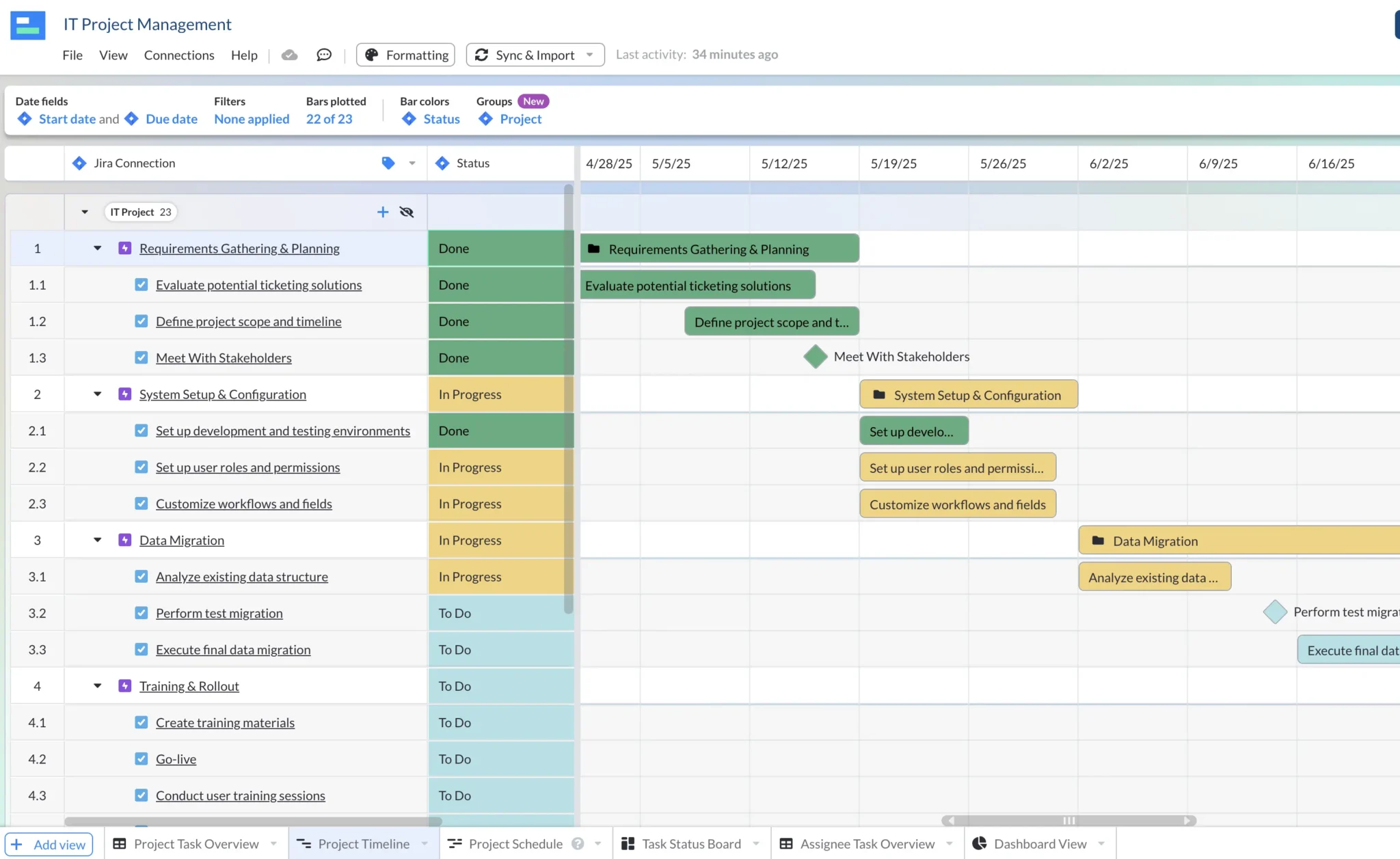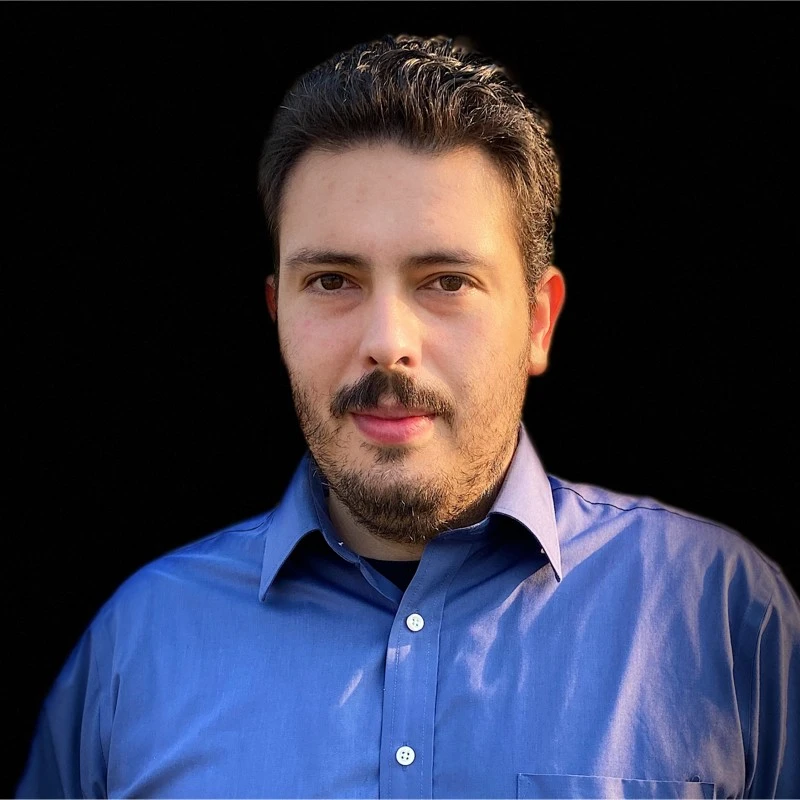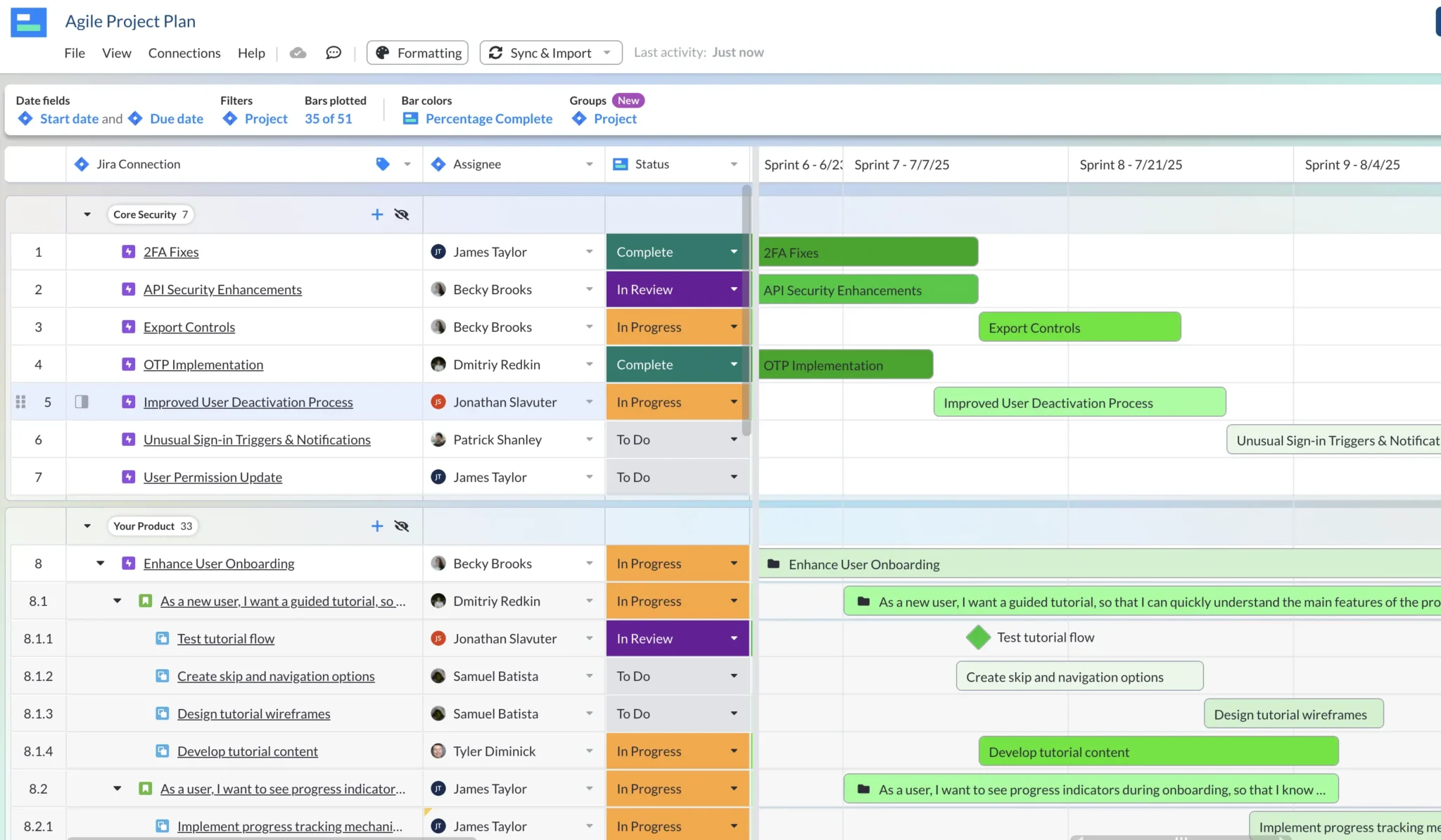
Experts Share Project Management Trends You’ll See in 2025
Everyone wishes they had a crystal ball. After all, if you could predict the future and see what’s on the roadmap for your work year ahead, wouldn’t you give it a go?
At Visor, we can give you a 1,000-foot-view of all the projects in your portfolio and help your team achieve crystal-clear alignment on every one. But we can’t exactly predict the future. So we went for the next best thing!
We spoke to some of the top influencers in the Project Management world, and asked them what big trends and exciting developments we can expect in 2025. Get out in front of your career with these peeks into the future from the people who know what’s next.
We’re Visor, a project portfolio management tool that’s designed to help you create a crystal clear single source of truth to share with stakeholders, no matter how many other apps your team uses. Try it for free.
Meet the Experts
Michele Badie is a PMP and Scrum-certified Program Manager who helps get out-of-line projects abc on track. She’s all about the “why” behind processes, and is passionate about supporting the professional growth of those around her.
Susanne Madsen is an international project leadership coach and award-winning author of several books. She specializes in transformational programs and one-on-one coaching for managers handling complex projects.
Mike Cohn is the founder of Mountain Goat Software, where he leads in-person Agile and Scrum training across the globe. He’s been sharing his hands-on experience since 1995, working in industries from banking to video games to aerospace, and everything in between.
Melissa Khan-Blackmore is ”The Project Management Girl.” She empowers women in project management through strategic career development and project management education.
Biggest Project Management Industry Changes
With huge shifts in format, tools, and locations, work in general is rapidly evolving. What trends will be the most significant for PMs?
Returning to the office is worth a closer look – we’re seeing more and more of it, but is it for the best? Mike Cohn said that, “Hybrid work is harder to manage. We can’t read each other’s body languages. We can’t as easily roll chairs together and talk through a problem. We don’t bond and develop empathy for each other as easily and cross-training is harder.
Organizations trade all this for individuals being more individually productive.
It remains to be seen, though, if the team is more effective. Each organization needs to figure that out. Project managers will be vital in this as they’re closest to the teams. Data can help but just as important will be the opinions of project managers based on their interactions with team members.”

Susanne Madsen
Susanne Madsen also weighed in on hybrid and virtual work. “We continue to see the trend of project managers working with global teams across time zones, different cultures, and all remote. In the old days when we were sitting in the office, you could pick up on people’s body language and you could lead that way.
Once we asked:
- Are they showing up for work?
- How are they showing up for work?
- Are they okay with the work I’m giving them?
- Do they look motivated?
- Are they procrastinating?
- Are they at their desk?
All this sort of stuff we used to be able to pick up. But now it’s a new normal and it means that project managers need to truly adapt. To lead effectively online, we can no longer pick up on all these cues that we saw in the office. We need to be very explicit in how we lead or manage our people.
We need to ask different kinds of questions. We need to ask questions that really are open questions, not just yes or no questions.
We need to ask questions like:
- How are things for you?
- What are you working on at the moment?
- What obstacles are there for you at the moment?
- How are you feeling?
This new way of questioning can engage people and helps us gauge how they really are. We need to be much more explicit, explicitly and deliberately checking in with people.
We can no longer make it up as we go along. We have to truly adapt. And that means being deliberate and clear communicators.”
Michele Badie drew our attention to the ways mental health will show up more and more in the office. She says that it’s time for project managers to, “Take an active role in supporting your team’s well-being to prevent burnout.
Start by setting realistic goals and workloads—if timelines are tight, see where you can prioritize or delegate tasks. Encourage your team to take breaks, respect personal time, and openly discuss signs of stress or fatigue. Model a healthy work-life balance yourself to show that it’s valued.
By creating a supportive, sustainable work environment, you keep morale high and help your team stay motivated and productive for the long haul. A happy, healthy team is crucial to project success.”
Melissa Khan-Blackmore notes that we’re seeing big changes in project management across every industry. “Healthcare and technology are experiencing significant evolutions in project management approaches.
Healthcare is adopting more agile methodologies while maintaining compliance with regulatory requirements.
In tech, we’re seeing a shift toward more flexible frameworks that blend traditional project management with product management principles.”
Technology and Tools for Project Management
Technology has seen exponential growth in our lifetimes. Things that were science fiction just a decade ago are now parts of our daily lives. How can we expect them to impact project management?
The first prediction? AI is just what’s on everyone’s lips.
Michele Badie led with her AI predictions, which focused on using the tool, instead of fearing it. “To make the most of AI and automation, project managers should start by identifying tasks that can be streamlined, such as scheduling, data analysis, and risk assessment. Integrating AI in these areas will free up valuable time for strategic decision-making.
Understanding how AI tools analyze data to use insights effectively for planning and forecasting is essential. As processes become more efficient, be ready to adapt workflows and focus on high-value activities like stakeholder engagement and proactive risk management. Begin with a small integration, assess its impact, and gradually expand as the team grows more comfortable with AI-driven insights.”

Melissa Khan-Blackmore
Melissa Khan-Blackmore weighed in on AI right away, too, pointing out how changes at some of the biggest companies in project management predict where the industry is moving. “The integration of AI in project management is definitely reshaping the field. PMI recently merged with Cognilytica, who coined a specific methodology for running AI projects. This is a huge shift because we are now adding any entire methodology to project management. It’s like when Agile was introduced, it changed the way we ran projects forever!
We’re seeing this huge push for use of AI-powered tools that can help with resource allocation, risk prediction, and even basic project documentation. However, this is making soft skills aka power skills even more crucial – the ability to lead teams, show emotional intelligence, navigate complexity, and make strategic decisions that AI cannot.
Visor offers AI-powered templates, like this IT Project Plan Template:

I think the biggest challenge will be managing the rapid pace of these technological changes while maintaining data privacy, ethical use of AI, and the resulting shifts in the job market. With the rise of AI, new skills are going to be in demand – project managers who can use AI are going to be more sought-after candidates.
Project managers need to prepare by:
• Developing strong change management skills (to be able to manage these changes in AI and how it fits into workflow and managing projects, and the PMO)
• Understanding AI capabilities and limitations (trainings, courses, applying AI in every day uses).
• Strengthening their ability to lead (sharpen your soft skills and power skills)”

Mike Cohn
Mike Cohn also agreed: “AI will, of course, continue to be a trend. Because companies will continue to strive to do more with less. I’m not sure we can call doing more with less a trend, as that’s been going on more or less since cavemen drew the first Gantt chart.
While doing more with less, or perhaps better said, efficient use of resources, is always important, doing so gets more or less emphasis at different times. We’re in a period where it’s being emphasized. Even though agile and Scrum are over 20 years old, until recently they were viewed as hot, new things.
We’re seeing agile becoming more what teams do but less what teams talk about.”
Beyond AI and agile, we heard some good advice about evaluating your techstack. Michele Badie added a reminder to take another look at what you’re working with. “Make it a habit to evaluate your current tools—are they still meeting your needs, or could new features save you time and effort?
Stay ahead by regularly exploring the latest project management tools that can streamline your work. Look for software that offers real-time collaboration, advanced reporting, and easy integration with other approved systems your team uses.”
PULL: Looking to upgrade your tech stack? Try Visor, a project portfolio management tool that gives you the 1,000 foot view while also letting you dive deep into every project. Get started for free.
But with increased connectivity comes increased demand on your time, says Susanne Madsen. “Because we are all having to be available 24/7, it’s very difficult to switch off. We always need to be available. That’s a result of technology, but it’s also as a result of working with global teams.
If your team in China is going to bed, but your team in the US is already working, and they need to collaborate, when can you ever really rest? This puts much more pressure on people and project managers and their teams, who have been working around the clock in some global organizations.
The trend is that this is becoming more acceptable, therefore it’s also becoming a necessity that project managers set boundaries. People burn out from that need to always be available. But project managers and their teams are beginning to say no. And that is becoming more accepted, and we have to accept it, because we can’t continue to work with teams that are burned out.”
Emerging Skills for Future-Ready Project Managers
There’s more to the next year than trends and tech – but you already knew that. If you want to stay on the cutting edge, here’s what skills and training the experts recommend.
Susanne Madsen weighed in on communication in an increasingly-remote world. “So the coaching leader is much more important when we work remotely.
When we delegate a task, it’s critical to be explicit about scope. Don’t just say this is what I expect you to deliver. Is that okay? No, we need to collaborate around that.
So I could say, this is what I expect you to deliver. What does it look like from your side? What is realistic from your side? What are you thinking about this task? What are your other commitments? How are you going to fit this into your other projects?
It’s open questions! We are collaborating. It’s not just me telling you what to do or making assumptions about what you will or will not do. To support a global workplace with many different cultures, we need to make our communication much more explicit, much more clear, and ask these crucial open questions that are really a hallmark of leadership.”

Michele Badie
For such leaders, says Michele Badie, a change-based mentality is a top skill. “Embrace your role as a change leader by helping your team navigate new processes, tools, and workflows.
Start by communicating the “why” behind each change—people are more willing to adapt when they understand the purpose and benefits. Encourage feedback, address concerns, and provide training to ease the transition.
Change is the new normal, so lead by example with a flexible mindset, showing resilience and positivity. Your adaptability will set the tone, making it easier for your team to stay motivated and engaged through any shifts that come their way.”
And while flexibility still matters, agile isn’t the hot buzzword it used to be. Instead, think in terms of hybridization. From Mike Cohn: “Agile is no longer the hot new thing teams need to talk about. Agile practices, though, remain what successful teams are doing.
I think we’ll see more hybrid agile projects that incorporate the best of agile team-level practices with more traditional practices aimed to improve the likelihood of success.
I’ve long mixed traditional management techniques into my very agile approach. I think hybrid agile can be a good approach, but with a couple of caveats. For example, agile encourages the use of self-managing teams. That’s an all-or-nothing thing. You can’t tell a team they’re self managing unless you disagree with something they choose to do.
In adopting hybrid agile approaches, it will be important for project managers to make it the best of both rather than the worst of both.”
But you don’t have to overcomplicate it. Melissa Khan-Blackmore says that just three skills will make all the difference for PMs who want to stay on the cutting edge. “There are three emerging skills for 2025:
- AI literacy and the ability to leverage AI tools effectively to manage better projects, save money, and deliver on goals quicker
- Advanced data analysis and interpretation using AI (predictive analytics is going to be big!)
- Change management in digital transformation to manage these AI pushes”
So if you can corner those three skills, you’ll likely be in a good position next year.
Bonus: Future-Proofing Your PM Career
We also had a weigh-in from friend of the blog, Alex Ortiz, founder of Apetech tutorials, on future-proofing your project management career.

Alex Ortiz
“[When it comes to future-proofing your PM career] put the whole agile, scrum, sprint, all of that on the side. You can be influenced by those things. You can definitely leverage them. But I think too many people hide behind the process, and it’s not effective.
At the end of the day, it’s about delivering the product. At the end of the day, you have to effectively deliver results.
Focus on that end goal and work your way backwards from there, because it’s the only way to be effective as a program manager and not get lost in the process.”
You can watch more from Alex on his YouTube channel.
Your Visor workbook, built faster than ever with AI Smart Templates! Instantly generate Gantts, dashboards, and more. Try it for free today!
What are your 2025 project management predictions?
The experts have spoken, are you listening? We’re looking forward to an exciting year for project management, and this advice will help you get ahead of the trends.
Interested in being on the cutting edge of project management tech? Try Visor, a project portfolio management tool that will help you get your teams and stakeholders into crystal clear alignment across every project.
Visor is one of the most easy-to-use AI project management tools on the market. You can milestone Gantt charts, responsive tables, beautiful dashboards, and much more with our AI-powered templates. Get started for free.
Agile Project Plan Template Example, created in Visor:






